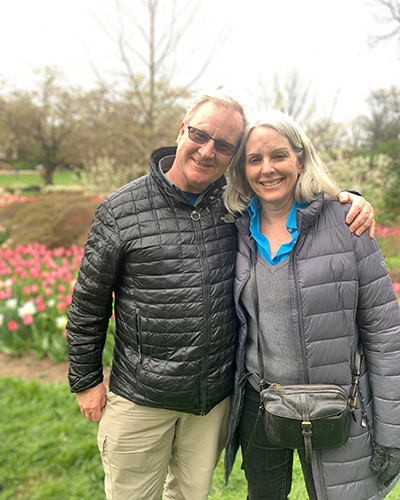
Dan Brennan ’81, a Cornell honors graduate in chemistry, hated medical school during his second year at the University of Iowa. It seemed to be the mindless pursuit of an A.
Then, in a psychiatry class, he encountered a songwriter who was hospitalized for what seemed to be schizophrenia. When the professor asked the songwriter what advice he had for the students, he answered, “You got to learn it, you got to learn it for us, man.”
“His words hit me like a thunderbolt,” Brennan said. “I wasn’t studying for a grade; I was learning how to help patients.”
Today he is medical director of the Comprehensive Transplant Center at Johns Hopkins Hospital in Baltimore. He oversees more than 100 surgeons, physicians, and support staff who last year performed 430 transplants of kidneys, livers, hearts, and lungs.
Brennan was drawn to transplantation as an 8-year-old when he learned of the first successful heart transplant. When he was studying at Iowa, the kidney was still the only organ that could be transplanted with reasonable success—failure rate was about 50%. Brennan, a kidney specialist whose expertise includes preventing infections that cause organ rejection, has been at the forefront of massive changes that have improved the success rate of kidney transplantation and led to advancements in transplanting other organs.
During his career—including a previous leadership position at Barnes-Jewish Hospital in St. Louis—Brennan has taught future physicians and nurses, contributed to more than 400 peer-reviewed publications, written chapters for 29 books, given more than 200 talks to national and international audiences, edited professional journals, and helped prepare grant proposals that have raised $60 million for research.
“I work 60 to 80 hours a week,” he said. “Also, I’ve been at this a long time.”
But his major personal rewards, he said, come from teaching and treating patients.
While Brennan was at Iowa, he and his college sweetheart, Susan Kozal Brennan ’82, were married. She earned a doctoral degree in philosophy at Iowa and began a career as a college professor by teaching at Cornell during the 1986-87 academic year. She took 14 years off to raise the couple’s four children, but resumed teaching and is now a professor of ethics and philosophy at a community college in Baltimore.
Cornell was the source of lasting friendships for the couple, and they recently endowed a fund to support students studying abroad.
Brennan grew up in Lombard, Illinois. “I went to Cornell,” he said, “because I was told I could do both pre-med and theater. Northwestern said I had to choose.”
Looking ahead, Brennan said that AI will improve diagnostic techniques and the processes of organ allocation, while gene editing over the next 10 years will greatly improve transplant tolerance and lead to the use of animal tissues or organs in humans.
“I have a dream that one day Iowa farms will be raising genetically modified pigs for all human organs so that no immunosuppression will be required. And then I’ll be out of a job.”
Dan Kellams ’58 has written two books set in his hometown of Marion, Iowa. His career spanned nearly 50 years in public relations in New York City, where he worked as a corporate and agency executive and, later, as a freelance writer and editor.